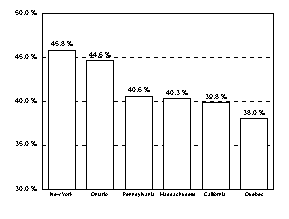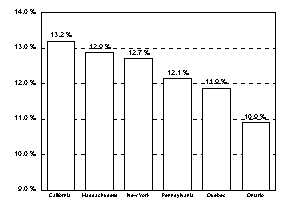1998-1999 BUDGET:
LIGHTEN THE TAX BURDEN OF INDIVIDUALS AND BUSINESSES
"It is our duty to create conditions that foster the development of businesses by gearing the taxation system to job creation."
— Bernard Landry
(Québec City, March 31, 1998)—Deputy Prime Minister and Minister of State for the Economy and Finance Bernard Landry announced in the 1998-1999 Budget Speech a reduction in the payroll tax paid by small and medium-sized businesses. In this way, the taxation system can serve as a lever for economic development and job creation.
REDUCING THE TAX BURDEN A PRIORITY
Objective: Focus on Jobs, the government’s economic strategy, confirms the need to reduce the tax burden in Québec with a view to stimulating job creation. The Commission on Taxation and the Financing of Public Services drew the same conclusion.
Today, the government is committing itself, once the deficit has been eliminated, to using most of its leeway to reduce the taxes Quebecers pay.
"Our strategy is simple: lower taxes means more jobs. With a stronger economy, we will be in a position to further trim the tax burden while bolstering social justice and fairness," Mr. Landry noted. This commitment is reflected in the reform of the corporate taxation system as it applies to SMBs, which contribute to job creation.
$500 MILLION LESS IN PERSONAL INCOME TAX IN FISCAL 1998
The Deputy Prime Minister reviewed the important measures he announced last year and that will fully take effect in fiscal 1998:
– $841-million reduction in personal income tax:
– the tax reduction stands at 15% in the case of households with incomes under $50
000;
– an additional 200 000 taxpayers will no longer pay income tax in 1998;
– the taxation system is dramatically simplified for 80% of taxpayers.
"All told, even when account is taken of the increase in the sales tax rate, Québec households will benefit from a $500-million net reduction in their tax burden," the Finance Minister added.
37% DROP IN THE PAYROLL TAX PAID BY SMBs
"Today, we must focus on the taxation of SMBs and implement measures geared to job creation that will benefit all Quebecers," Mr. Landry continued.
The Québec corporate taxation system relies heavily on the payroll tax, which is a disadvantage as far as employment is concerned. The corporate taxation reform announced today includes:
– a 37% reduction in the payroll tax paid by SMBs, to be introduced in two stages:
- on July 1, 1999, the tax will be reduced by 12%; to ensure that the reform is neutral from a financial standpoint in 1999-2000, the small business deduction and the refundable tax credit for losses will be eliminated;
- on July 1, 2000, the payroll tax will again be reduced, this time by 25%, for a total of 37%;
– starting July 1, 1999, SMBs will be entitled to $23 million in additional QST refunds;
– enhancement of the tax holiday for new corporations;
– enhancement of the dividend tax credit;
– implementation of guaranteed tax rates over a 10-year period for companies that commit themselves to major investment projects.
"This major reform will be neutral as regards the government’s financial framework, until we have eliminated the deficit. Subsequently, government revenue generated by businesses will decrease by $293 million," Mr. Landry noted.
IMPACT ON THE GOVERNMENT’S FINANCIAL FRAMEWORK OF THE CORPORATE TAXATION REFORM
(in millions of dollars)
| 1999-2000 | 2000-2001 | 2001-2002 |
| 0 | -225 | -293 |
A TAXATION SYSTEM GEARED TO EMPLOYMENT
Almost all Québec businesses will benefit from the reduction in fixed tax expenses. "Québec companies, which already enjoy an advantageous taxation system, will be encouraged by the reduction in the payroll tax to create more jobs," the Deputy Prime Minister indicated.
Under the reform, the effective payroll tax rates in Québec will be highly competitive in relation to those in effect in other jurisdictions. Moreover, tax rates on corporate earnings in Québec, a decisive component of fiscal competitiveness, are still among the lowest in North America.
CORPORATE TAX RATES AFTER THE REFORM
| CORPORATE INCOME TAX1 as at December 31, 1997 |
PAYROLL TAXES1 Québec and other jurisdictions as at December 31, 19972 |
|
 |
 |
|
| 1 Maximum tax rates levied by different levels of government on the active income of businesses. | 1 All direct and incidental tax assessments. 2 Business with a total payroll of $1 million, applying the reform on that date. |
SOURCE: ANDRÉE CORRIVEAU
COMMUNICATIONS ADVISOR
OFFICE OF THE DEPUTY PRIME MINISTER
TELEPHONE: (418) 643-5270